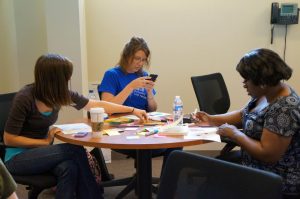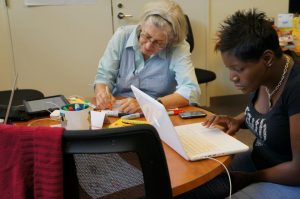Digital Is … Re/Composing: Rethinking Writing with K-College Teachers
(Today’s blog post comes to us from Dr. Will Banks, Director of the University Writing Program and Director of the Tar River Writing Project, a local site of the National Writing Project. Dr. Banks is associate professor of Rhetoric and Writing Studies in the English department at ECU; his research focuses rhetoric, pedagogy, writing program administration, and sexuality. He current book projects, Queer Literacies explores the ways in which gay men and lesbians articulate literacies of queer(ed) identities.)
When university faculty talk to me about their concerns for student writing, I hear a good deal of critique of public schools, students, and their teachers, and all the things they’re not doing right. But I don’t hear that many people talking about anything they are doing to help or address this presumed lack or problem.
Except, of course, those folks who are part of the Tar River Writing Project, which again this past summer sponsored six writing camps for elementary, middle, and high school students, as well as two workshops for K-college teachers: the first workshop, “Developing High School Writing Centers“, provided a space for Jennifer Smyth, an experienced high school teacher and developer of a thriving writing center at her school, and Kerri Flinchbaugh, an experienced teacher and assistant director of the UWP at ECU, to help other teachers tap into the rich resources of their strongest writers in order to provide them with leadership opportunities through serving as writing consultants to other students.
The second, and the focus of today’s blog, “Digital Is … Re/Composing: Developing 21st Century Literacies Across the Common Core“, brought together a diverse group of teachers from K-12 public and private schools, as well as community colleges and ECU, to explore the complex and sophisticated digital literacies that today’s school-aged students bring to classrooms.
Key questions that participants explored included the following:
- What does it mean to “write” or “compose” in the 21st century?
- What does “text” look like? What counts as a “text” today?
- How do schools encourage/promote literacy practices that seem constantly to change or evolve?
- How can schools adjust teaching practices to allow students greater leadership and responsibility with their writing?
- How can teacher work with students to create more authentic and meaningful writing/composing projects for school?
- What are the affordances and constraints of current digital technologies of writing? How can teachers and students engage those issues more critically?
These sorts of questions helped participants frame their discussions in the institute, particularly as they read and explored Because Digital Writing Matters and as they played with a host of web- and iPad-based composing platforms. During the first week, teachers worked to develop their own digital literacies by critically engaging with tools like Voicethread, Evernote, Pinterest, Twitter, Google Drawings, Prezi, Xtranormal, Puppet Pals, Animoto, Art Doodles, and other similar tools. Teachers used the second week to share an inquiry project they developed around a particular tool or set of tools, all with an eye toward how these digital tools could encourage complex reading and writing activities.
By the end of the second week, we all felt as though we had learned a great deal, both in specific tools we might use with students and in recognizing how so many of the new media tools can provide students spaces to engage in higher-order critical thinking skills like analysis and synthesis, as well as 21st century imperatives like those embodied by Connected Learning.
As the Common Core State Standards reduce student learning and fail to encourage teachers or students to think expansively or boldly about our potential as human beings, and as EduCorps like Pearson remain active in deprofessionalizing teachers and teaching, it is imperative that all educators work more closely together, across disciplines and grade-levels, to ensure that young people have the best education possible. That’s what the Tar River Writing Project sees as its mission in Eastern North Carolina, and we’re always looking for teachers who want to be part of that work.


